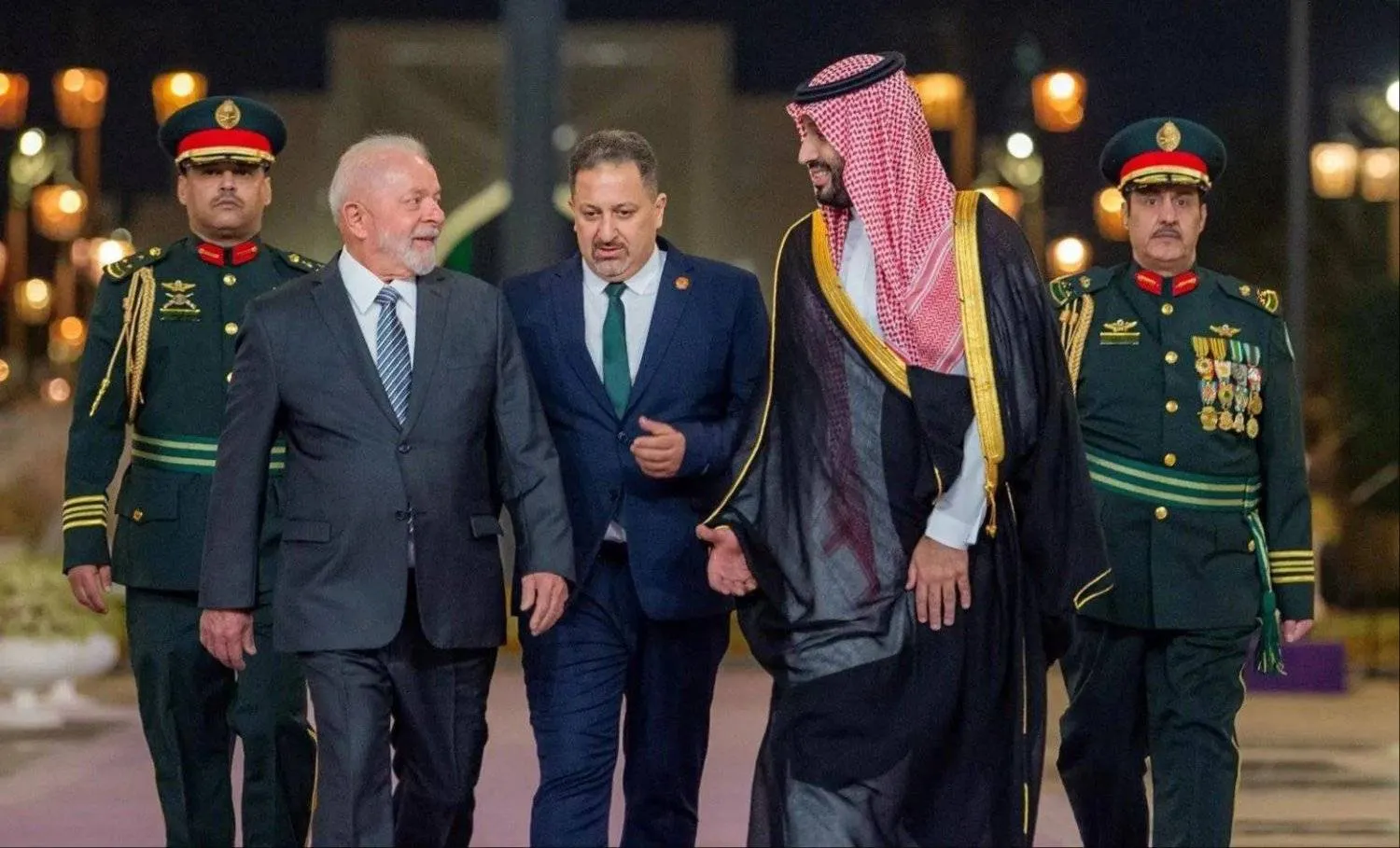Brazilian Ambassador to Saudi Arabia Sergio E. Bath said that the exchange of high-level visits between the two countries highlight their common vision and their desire to deepen bilateral relations and cooperation at the regional and multilateral levels.
During an interview with Asharq Al-Awsat, Bath said that in 2018, Brazil and Saudi Arabia, two members of the G20, celebrated the 50th anniversary of the establishment of their diplomatic ties.
He explained that Saudi-Brazilian relations have witnessed tremendous growth since 1968, especially under the current leadership of the Custodian of the Two Mosques, King Salman bin Abdulaziz, and Crown Prince Mohammed bin Salman.
Brazil officially assumed the presidency of the G20 in December 2023. The group’s summit will be held this year in Rio de Janeiro on Nov. 18-19.
According to the ambassador, Saudi Arabia and Brazil are considered economic powers in their regions, and maintain ideal relations with neighboring states, which include respect for each other’s sovereignty, dissociation from regional disputes and cooperation in various fields to achieve mutual benefit, in addition to facilitating the free flow of intra- and internal trade and investments within economic blocs and regions.
The interview coincided with the visit of Saudi Minister of Industry and Mineral Resources Bandar Al-Khorayef to Brazil as part of a tour that will also take him to Chile.
Bath said that the Saudi minister’s trip confirms the Kingdom’s growing interest in strengthening bilateral relations with Brazil.
The delegation, according to the Brazilian diplomat, is exploring opportunities for cooperation in the industrial and mining sectors, exchange of expertise, and the latest developments in industrial technologies and joint investments.
He pointed out that the delegation is focusing primarily on developing supply chains, enhancing technological exchange, and driving innovation to achieve sustainable development and economic flexibility, as well as discussing opportunities for cooperation in the fields of food manufacturing, medicine and aviation.
Agreements
During the Brazilian-Saudi Investment Forums held in Brazil in 2023, $9 billion were made available for new bilateral investment projects until 2030, according to Bath, who noted that during one of these events in Sao Paulo, the two countries signed agreements worth around $3.5 billion.
Economic cooperation
Bath told Asharq Al-Awsat that Saudi Arabia and Brazil are the two largest economies within their regions, adding that commong stances have created enormous potential for cooperation in various sectors to achieve mutual benefits.
“In 2019, the Saudi Crown Prince announced the allocation of $10 billion to invest in Brazil, and since then significant progress has been made. For example, but not limited to, approximately $765 million was invested in Minerva Foods and BRF through SALIC, a subsidiary of the Public Investment Fund (PIF),” he stated.
The Brazilian diplomat added that Al-Manara Metals Company, supported by PIF, concluded a deal worth $2.6 billion to acquire a 10 percent stake in the basic metals division of Vale SA, while PIF has $400 million worth of investments in the Brazilian financial sector.
He further stressed that the Kingdom has shown interest in many sectors in which Brazilian companies are competitive, including defense and space, agriculture and fresh food, medicines and medical devices, clean energy and green hydrogen, communications, science and technology, and digital economy and innovation.
Regarding investments in Saudi Arabia, Bath said that the joint venture agreement between BRF and the Halal Products Development Company, a subsidiary of PIF, is another example of the work of Brazilian companies and their long-term engagement and commitment to this country.
Areas of cooperation
“During President Luiz Inacio Lula da Silva’s visit to the Kingdom, in November 2023, Embraer signed three cooperation agreements with the Saudi government and companies in the fields of civil aviation, defense and security, and air mobility in urban areas,” the ambassador told Asharq Al-Awsat.
He went on to say that the Brazilian Ministry of Mines and Energy signed a memorandum of understanding to promote cooperation in the field of energy, including oil and gas, electricity, renewable energy, energy efficiency, petrochemicals, hydrogen, and the circular carbon economy.
Bath explained that the MoU covers digital transformation and innovation, strategic partnership development, supply chain, technology enhancement, and localization of industry-specific materials, products and services.
On trade exchange, the ambassador said: “Brazil’s exports to Saudi Arabia are still traditionally dominated by poultry, beef, soybeans, corn and sugar, representing about 80 percent (of exports), while the share of other food and non-food products stands at only 20 percent.”
“However, when looking at Brazil’s total exports to the world, about 60 percent of those consist of manufactured consumer and industrial products, which indicates that Saudi Arabia has not yet explored the comparative advantages and competitiveness of food and non-food products manufactured in Brazil.”
Bath emphasized that Saudi Arabia has recognized his country as a strategic partner for its food security, and has undertaken some important initiatives and investments.
“However, the great potential for further cooperation remains untapped, which I hope will be embodied through all the visits made by high-level delegations,” he remarked.
Apart from the food, non-food consumer goods and industrial sectors, Bath pointed to great potential for cooperation in various sectors, such as healthcare, defense, clothing and footwear, chocolate and confectionery, other processed foods, household, electrical and mechanical appliances, heavy products and equipment.
Volume of bilateral trade
According to the diplomat, Saudi Arabia is Brazil’s first trading partner in the region, and Brazil is the Kingdom’s largest trading partner in South America, with total bilateral trade in 2023 amounting to about $6.7 billion.
“Although Brazil’s exports to the Kingdom mainly consist of animal proteins and agricultural products, a gradual change in patterns has been observed in exports of manufactured industrial and consumer goods. The most important food exports from Brazil to Saudi Arabia are chicken, sugar, corn, soybean products and beef,” he underlined.
Non-food exports, according to Bath, include iron and other ores, wood and its products, weapons and ammunition, machinery and equipment, and transportation equipment. The main exports from the Kingdom to Brazil are crude oil, fertilizers, plastic products, aluminum products, and other petrochemicals.










